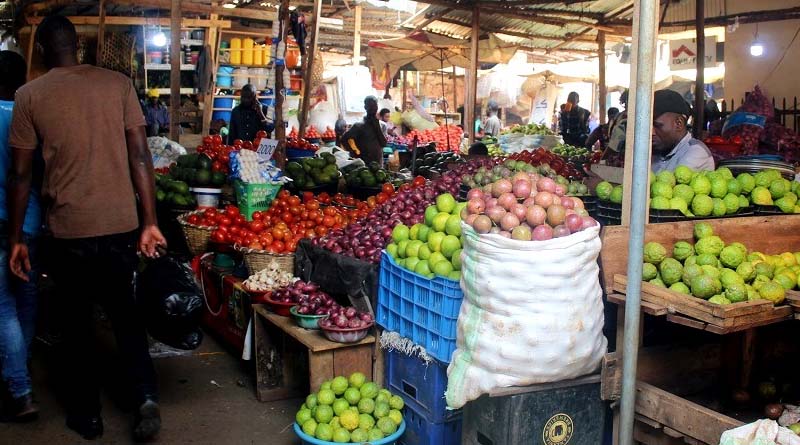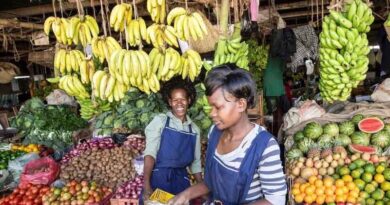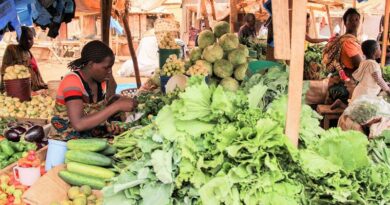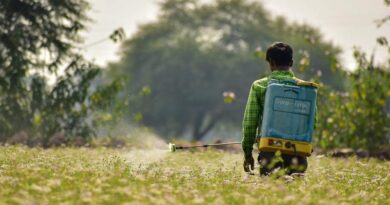CABI’s GRASP Fellowship awardee working in partnership to help increase food safety in Uganda’s urban markets
31 January 2024, Uganda: Dr Monica Kansiime, who was awarded a Gender Responsive Agriculture Systems Policy (GRASP) Fellowship aimed at improving policy process in agri-food systems, is working in partnership to help increase food safety in Uganda’s urban fresh fruits and vegetable markets.
Nutrient-dense vegetables complement staple-based diets, providing both food and nutrition security. However, food safety problems linked to consuming fresh fruit and vegetables are increasing.
In Uganda, over 60% of the known foodborne diseases result from the consumption of fresh and perishable foods which are often sold through formal and informal market channels (Roesel 2014).
Contributing factors to the poor food safety standards
As well as limited food safety knowledge, some of the other contributing factors to the poor food safety standards include poor market infrastructure, insufficient rubbish collection, limited access to water, and a lack of access to safe storage facilities.
Dr Kansiime, Deputy Director, CABI Africa, was bestowed the African Women in Agricultural Research and Development (AWARD) honour as one of 50 African mid-career women who are now on a two-year career development programme.
The GRASP Fellowship, featuring policy practitioners from Ghana, Kenya, Malawi, Nigeria, Uganda, and Zambia, is helping to grow the pool of confident and capable African women to lead policy changes that can improve the livelihoods of millions of African smallholder farmers and increase food security.
Gender dimensions in food safety highlighted
As part of her GRASP Fellowship, Dr Kansiime worked in partnership to produce a factsheet that highlights gender dimensions in food safety with a specific focus on urban fruits and vegetables markets in Uganda that might also be applied to other countries in Sub-Sharan Africa.
It is hoped the factsheet, compiled together with CABI colleague Lilian Owembabazi as well as Clare Arinitwe, of the Anticorruption Coalition Uganda, and Dr Annet Mulema of the International Development Research Center (IDRC), will contribute to the design of a gender-inclusive and equitable National Food Safety Policy for Uganda.
Dr Kansiime said, “The World Health Organisation (WHO) reports that almost 1 in every 10 people in the world will become unwell and 420,000 people will die, every year, after eating contaminated food.
“Africa and Southeast Asia have been deemed to have the highest incidence and mortality associated with foodborne diseases.
“There is a need to centre women and youth as key stakeholders in shaping food safety processes, as well as address the intersection of food safety and aspects of gender equality, to ensure that the design of a national food safety policy is inclusive and equitable.
“Gender disparities exist in access to resources, knowledge, and decision-making power, impacting food safety practices. Recognizing and addressing these challenges is essential to empower women and youth in these markets and enhance their contribution to Uganda’s food economy.”
Harmonized framework to implement activities
Dr Kansiime and Dr Mulema in their outline for a Policy Innovation Project (PIP), state that a Food Safety Strategy of Africa (FSSA) aims to provide a harmonized framework to implement activities that mitigate various food safety threats that negatively impact consumers’ health, with a specific focus on food safety to achieve expanded trade.
However, they stress while these policies recognise women as an efficient target for food safety education to improve health, it is unlikely to be transformative.
Solutions to the food safety challenge, they say, will involve various strategies. These include developing policy actions to regulate food safety practices and empowering key actors to enhance their contribution to the food economy.
Also important is the capacity building of food business operators – especially the small and medium women, men, and youth food vendors, in hygiene and food handling practices, post-harvest management, and risk communication strategies to mitigate risks.
Central role played by women and youth
Dr Kansiime added, “Uganda’s urban fruit and vegetable markets are characterized by diverse stakeholders, with women and youth playing a central role in various aspects of the supply chain, from production to retail.
“However, gender disparities exist in access to resources, knowledge, and decision-making power, influencing food safety practices and compliance to standards.
“This PIP will therefore pay particular attention to capacity-building needs and priorities of women and youth to enable equitable allocation and access to resources and facilities that enhance food safety practices in these markets.”
With support from Kampala Capital City Authority (KCCA) and market leaders, three public and two private markets were visited as part of this study, collectively accommodating 4,100 vendors of which 52% are fresh fruits and vegetable traders; 70% women, 20% youth and 10% men.
Also Read: Rallis India scales up supply chain effectiveness through digital platform ‘Plan Guru’
(For Latest Agriculture News & Updates, follow Krishak Jagat on Google News)















